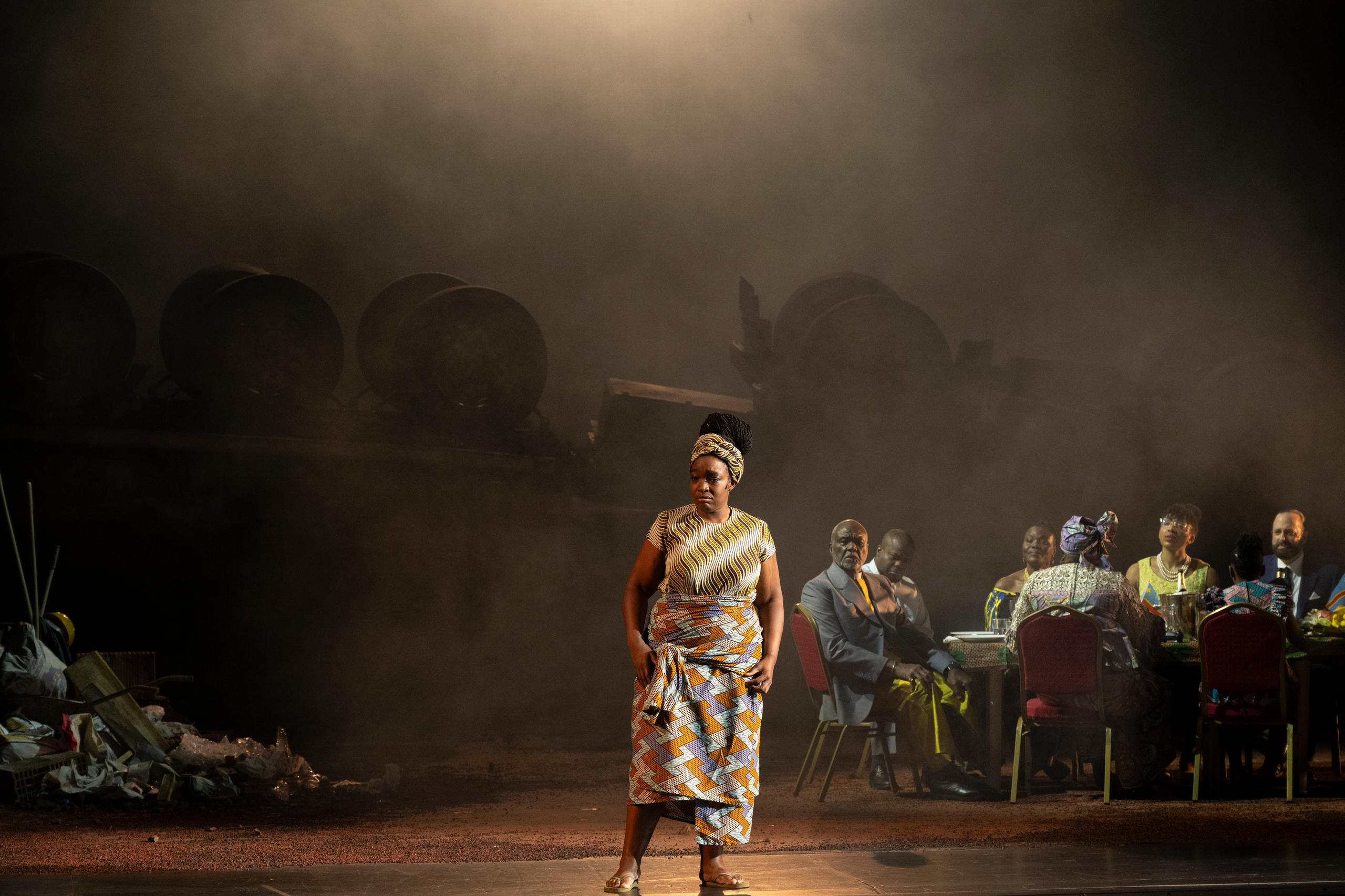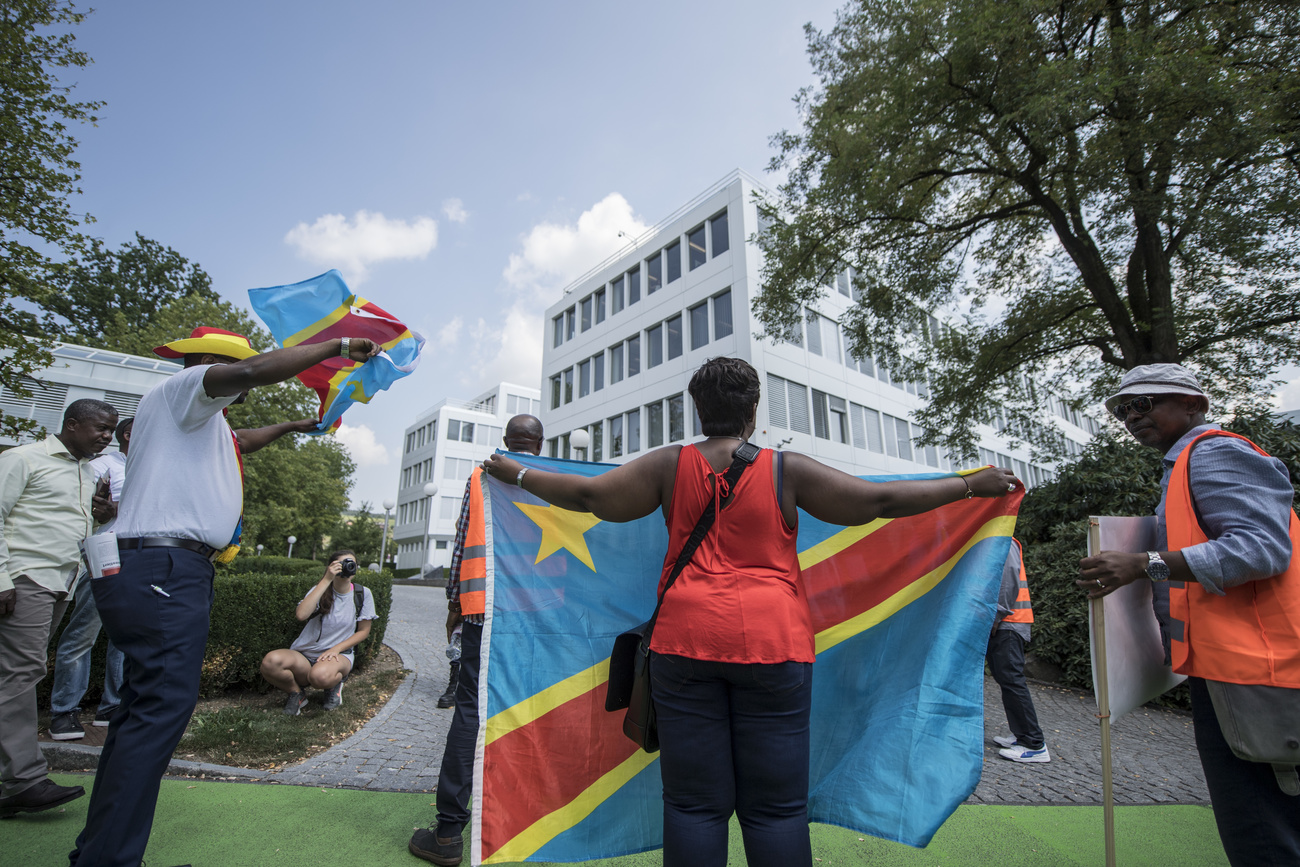Monumental sadness: Geneva theatre takes on DRC-Glencore injustice

The global premiere of Justice at the Grand Theatre of Geneva this week proved a slap in the face as much as a creative coup taking opera into uncharted territory.
If you think that opera is just an out-dated form of elite entertainment, Justice will ask you to think again. This modern spectacle shines a harsh light on Switzerland-based commodity traders who thrive in lakeside luxury at the expense of people whose struggles in sun-scorched and rain-battered lands remain largely invisible to the international public.
It is foremost a cry for justice – complete with a conscious-clearing crowdfunding opportunity – for the victims of an atrocious acid truck accident that left 21 dead and survivors completely disfigured in the Democratic Republic of Congo. Death, disfigurement, dignity and thwarted justice are leitmotifs in this opera by Catalan composer Hector Parra, Swiss stage director Milo Rau and Congolese librettist Fiston Mwanza Mujila.
This global collaboration examines exploitative power structures past and present through the lens of a tragic accident. Sub-Saharan Africa’s largest nation is traumatically linked to the West by slavery and colonialism, grim realities that echo in today’s global economic power dynamics. These links are dismantled on stage with music that draws power from plucky pulses of Congolese rumba and the lambasting lungs of an all-star cast of soloists challenged to embody both real and allegorical characters.
The catastrophe
The real-life inspiration for this joint commission and production is an accident that took place in 2019. A tanker carrying acid collided with a minibus on a road in Kolwezi. For some, death is quick. For others, it is an infernal torment stretched out over helpless hours trapped under the wreckage. The truck was heading to a cobalt mine of Swiss multinational Glencore. The world barely took notice. A flipped replica now dominates the Geneva stage.
“A big part of my work is trying to have a real impact, to talk about reality and to bring reality on the stage. And on the other side, to use the stage as a place of transcendence, of beauty,” Rau told SWI swissinfo.ch.
The opera, like the accident, unfolds in Kabwe. The village sits between Kolwezi and Lubumbashi, the native towns of young Congolese countertenor Serge Kakudji and the librettist Mwanza Mujila. Geography adds gravitas to their endeavour. Both addressed the audience and relay what it means to them personally to perform and project the voices of victims in global commodity trading hub Geneva.
The brutal irony that cobalt only acquires its value in the international market is not lost on them. Their pull-no-punches artistic collaboration with Rau – who dives into the world of opera for the second time with Justice – ensures it is not lost on the spectator either. Artistically, says Mwanza Mujila, the challenge is to combine fiction with the reality on the ground. And do justice to the real victims of these events.
“There are what I call main victims and collateral victims,” he told journalists ahead of the premiere. “In one way or another, all Congolese people are affected by the mining reality. In this country there is gold, copper, diamonds, all kinds of mineral ore but the Congolese people do not benefit from it.” In Justice, the scriptwriter is not just a credit line on the programme but himself a powerful character on stage.
Rau’s mise-en-scène delivers an unflinching look at this 2019 catastrophe that destroyed a community and scarred the nation. Three times he travelled to the region. That effort is reflected in the piece’s psychological authenticity and stage choices that blend documentary precision with operatic flair. The devil is in the details – and these deliver enough reality to honour the victims and drama to shock the audience.
“In the case of Justice, for me it is a monument of sadness,” he tells SWI swissinfo.ch. “There is a lot of sadness in the words, in the staging, in everything. You have an aesthetical side and a critical, legal side.”
On stage an all-star cast featuring Peter Tansits, Willard White and Katarina Bradić taps into universal themes. Dialogues between the living and the dead generate tension as they navigate guilt and loss, the good intentions of a symbolic company director and his wife turned into empty promises and ridiculous justifications. Zurich’s Titus Engel leads the orchestral prowess seamlessly blending contemporary opera and Congolese tradition.

Allegory and reality
French soprano Axelle Fanyo delivers a searing performance as the mother of a girl killed in the accident. Real story. “My daughter and her dreams were dissolved in acid,” laments Fanyo in a gripping aria documenting the child’s desperate journey from life to death. Rain on that fateful day spread the same sulphuric acid that consumed eyes, limbs and skins of people trapped under the minibus to an adjacent cemetery and farming fields.
At times the line between fiction and fact is disturbingly blurry. Marketplace scenes give way to close-ups of severed goat heads, flesh and bones. The audience struggles to compute whether the flesh is that of an animal butchered at the market or of humans shredded by the corrosive power of sulphuric acid, commonly used to leach cobalt-bearing materials.
“My life is not garbage, my legs are worth diamonds,” rages Kakudji on stage. He plays the role of Milambo Kayamba, one of the accident’s survivors, who lost both legs and is known locally as the Milliardaire (billionaire). The wheelchair-bound role had a double poignance for the Congolese artist. Kakudji witnessed as a child how mining transformed Kolwezi. As an adult, in Italy, he endured a vicious race attack in 2015 that left him in a wheelchair.
“It was evident that I had to play this role, even if emotionally painful,” he says.
On-stage filming, archive material and drone footage add to the veritas feel. The raw pain of survivors is transmitted to the audience through documentary-style details slipped into powerful song. Among these, the outrage of $250 (CHF215) settlements for those who lost a child and $1,000 for those who lost adult members of the family. “$250 is a terrible amount – sometimes it was even less than that.” Kakudji notes in a phone interview between performances.

The blame game
Who is to blame for this travesty? You. Me. Our smartphones. The cobalt-powered electric vehicles that are meant to save the planet. Global demand for cobalt that turned mining communities of the Democratic Republic of Congo into the wretched of the earth. The greed of multinationals who arrive with promises of jobs, hospitals and schools. The indifference of multinationals who fail to take meaningful responsibility when things go wrong.
“It’s the fault of the road. It’s the fault of the road. It’s the fault of the road,” rails mezzo-soprano Bradić, who plays the hit-and-run driver – a character inspired on the Russian helicopter pilots that Rau has encountered in the Central African Republic. The real culprit was a Somali and is now free, according to a lawyer in the DRC who follows the case.
A single road leads from Kabwe to global markets. Infrastructure is notoriously poor in this cobalt-rich nation. Local lawyers blame the failure to achieve justice for the victims on a slow-moving legal system, corruption and the asymmetry of a battle pitting traumatised, impoverished individuals against corporate structures with seemingly unlimited financial means and complex corporate structures.
In the Kabwe accident, Glencore’s Mutanda Mining had entrusted the transport of sulphuric acid to a subcontractor called Access Logistics. The latter in turn called on another subcontractor called Easy Way, which didn’t have a tanker truck to transport the sulphuric acid, so it too called on a private individual with a tanker truck.

Frustrating quest for justice
The case, which involves 11 plaintiffs, was dropped at the local level in January 2021. It is now on the docket of an appeals court in the Congolese capital, an unaffordable journey of over four hours for victims or their lawyers.
“We don’t know when the Court of Cassation will hand down a judgment, because the plaintiffs don’t have the financial means to continue the case in Kinshasa,” explains Maitre Josué Kashal of the legal aid centre accompanying the victims, Le Centre d’Aide Juridico-Judiciaire (CAJJ) in an email.
The crowdfunding campaign linked to the opera’s performance aims to help with that. “The audience when they leave the hall can actually help the characters that they see on stage in their struggle for a better life, for justice,” Aviel Cahn, the Swiss jurist currently at the helm of the Grand Theatre of Geneva, told journalists ahead of the premiere.
+ Justice for KabweExternal link
“Global business means global responsibility,” says Johannes Wendland, legal adviser on business and human Rights of HEKS-Swiss Church Aid. “Companies that earn billions in a state with weak infrastructure must take all necessary measures to prevent horrible accidents like the one in Kabwe in 2019. In cases of losses and damages, all affected persons must be sufficiently compensated. Global companies cannot be allowed to hide behind their suppliers.”
A trial in DRC may or may not yield justice; let alone force change in an industry racking massive profits. Sometimes the best shot at justice comes from innovative art forms that can shift conscience in the court of public opinion. The opera was a bold choice for the Theatre of Geneva. For Kakudji the opera is a vector for justice precisely because of where it was performed: the global heart of the raw materials trade.
“There are people who are linked either to the enterprise or what happened even if they don’t know about it,” he says. “Not all news reaches the ears of decision-makers. Being able to touch this world is a first step towards justice. I hope this opera will stir up energy and move hearts to search for solutions.”
Edited by Eduardo Simantob and Anand Chandrasekhar

In compliance with the JTI standards
More: SWI swissinfo.ch certified by the Journalism Trust Initiative












You can find an overview of ongoing debates with our journalists here . Please join us!
If you want to start a conversation about a topic raised in this article or want to report factual errors, email us at english@swissinfo.ch.